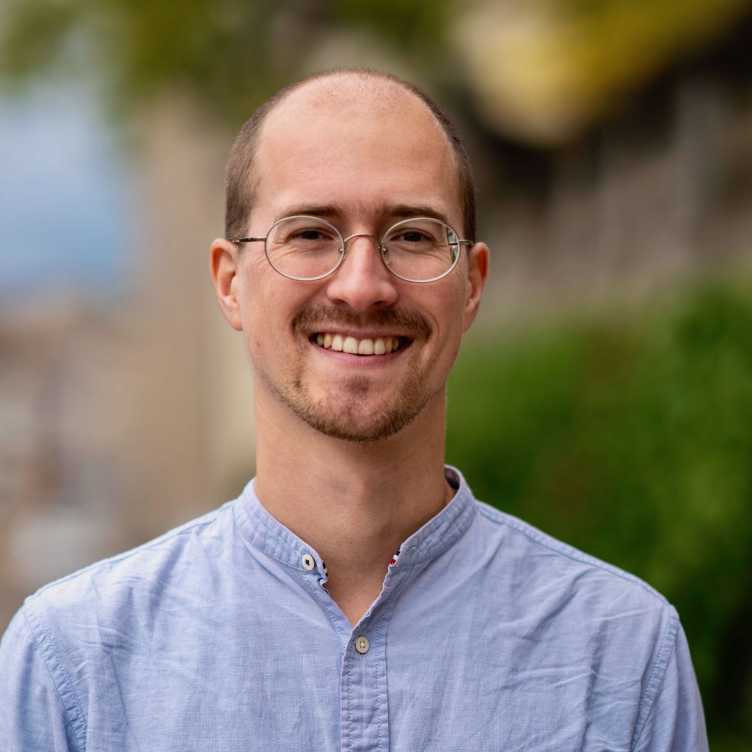Meet David Schnettler studying the origin of polymerases
The German biochemist is fascinated by the complexity of enzymes and their functionality as catalysts. Holding a NOMIS-ETH fellowship he chose the Bioprocess Lab (“great vibes!”) for his postdoctoral research on the origin and evolution of early enzymes. In his free time, he loves participating in races – on his two legs and on two wheels.

What did you know about D-BSSE before you came here, and what was your motivation to come to ETH Zurich?
ETH Zurich and D-BSSE were already on my mind since my PhD – some great collaborators (and competitors) were working here, there have always been many connections. After my PhD in Cambridge, I came to ETH Zurich to do a postdoc in the lab of Macarena Toll Riera in Zurich, working on protein evolvability. Recently, I received funding (the NOMIS-ETH fellowship) to do research on the origin of enzymes and, knowing that Sven Panke’s lab would be a great place to do this kind of work, I moved to the D-BSSE here in Basel.
What were your expectations, and were your expectations met since you arrived in Basel?
I partly grew up close to the Swiss border, in Konstanz, and so, after having lived in France and the UK for many years, moving to Switzerland felt a bit like coming home. I must admit that I have not seen much of Basel itself yet as I live in Berne and commute every day – but it feels like a very liveable city!
What were your first impressions…?
The vibe in the Panke lab and in the entire department is great, it’s such a welcoming place! The new department building feels like science fiction, it is just awesome. Same can be said about the entire research infrastructure, everything works very smoothly.
Which research will you pursue at D-BSSE?
My research aims at bridging the gap between prebiotic catalysts and the modern protein world. I am fascinated by the intricacy of the enzymes involved in the most fundamental processes of life. How did they possibly emerge, function, and evolve before reaching their modern complexity? More specifically, I’m looking at polymerases: Our (current) understanding of how life likely emerged on Earth is strongly tied to the appearance of nucleic acids, like RNA, acting as genetic and catalytic polymers. Accordingly, the proteins interacting with and, importantly, duplicating them must have been among the very first enzymes. However, modern polymerases are amazingly sophisticated and complex. Using tools from protein engineering, such as protein design and high-throughput screening I want to explore how simpler, ancestral forms of polymerases could have functioned and looked like.
Which hobby do you hope to pursue in Switzerland?
I love hiking with my family – the surroundings of Berne and the Bernese Oberland are full of family-friendly hikes! When without children, I also enjoy running and road cycling and love races that have a fun goal, like reaching a peak or surrounding a large lake. Switzerland is full of those! Coming originally from the Lake Constance region with its own “3-Länder-Marathon” (a marathon along the lakeside crossing Germany, Austria, and Switzerland) I am especially looking forward to running the equivalent “3-Länder-Lauf” in Basel next spring!
Many thanks, David, welcome to the D-BSSE and all the very best to you and your research!
David studied biochemistry at the University of Konstanz and École Normale Supérieure in Paris. He joined the University of Cambridge in 2015 for a MPhil and then a PhD in the lab of Florian Hollfelder where he used droplet microfluidics to evolve enzymes for new catalytic function. After his PhD, he moved to Switzerland for a postdoc in the group of Macarena Toll Riera, interfacing high-throughput screening with long-read sequencing to study the determinants of evolvability in proteins. In 2024, he was awarded the NOMIS-ETH fellowship to work on the origin and evolution of early enzymes at ETH’s Centre for Origin and Prevalence of Life (COPL), for which he chose the Bioprocess lab led by Sven Panke in Basel. He’s also a father of three and lives in Berne.